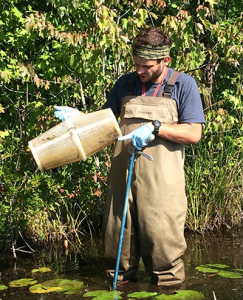Radioecology program prepares future scientists

Aiken, S.C. — People rarely contemplate the impact of nuclear activity unless power plants or nuclear production facilities reside near their communities. Those who live far from a nuclear facility, generally think about the environmental impacts of nuclear activities after an accident like Fukushima or Chernobyl.
For the scientists at the University of Georgia’s Savannah River Ecology Laboratory, the impacts of nuclear production are a primary focus. The lab has an ongoing mission to independently evaluate environmental impacts from operations on the U.S. Department of Energy’s Savannah River Site. This mission extends to educating the next generation of professionals to address those impacts.
This focus is not a new one for the lab. In-depth hands-on training of graduate students launched simultaneously with SREL’s founding in 1951.
In the late 1960s, SREL expanded its reach to undergraduates, mentoring more than 700 students through the lab’s experiential learning program. The program has twice received the UGA’s coveted Excellence in Undergraduate Research Mentoring Program Award.
Not resting on past achievements, Dr. Olin E. Rhodes, Jr., director of SREL, saw a need to do more at the undergraduate level. “It is essential to prepare undergraduates for the specialized needs required to evaluate the impacts of radioactive elements in the environment—the next generation of researchers must be astute in addressing the effects of radionuclides, or radioactive elements in the ecosystem,” said Rhodes.
This led to the lab establishing a Research Experience for Undergraduates in radioecology program in 2015. Funded by the National Science Foundation, the program recruits students from various colleges and universities around the country.
Ten to 12 undergraduates participate in experiential learning opportunities in the lab and in the field at SRS. They are responsible for all phases of research, from developing a hypothesis to articulating and presenting their results orally and at a research symposium.
Melissa Pilgrim, director of research at the University of South Carolina, Upstate, and co-coordinator of the program, said that the students are well prepared to investigate radioactive elements as well as other contaminants, like metals and mercury in the environment. “The 10-week research experience begins with intense training on protocols for safe handling of radioactive materials and contaminants, including skill in donning and removing protective wear,” Pilgrim said.
Summer 2016 participant Kyle Brown, a student at the University of South Carolina, Upstate, had the opportunity to put this skill set to work as he examined Florida green water snakes.
He examined the species, found on the site, in three different contaminated wetlands to determine if their contaminant concentrations correlated to the contamination history of the wetlands. Brown also had the benefit of accessing SREL’s 65-year database on these wetlands.
“The opportunity at SREL was priceless,” said Brown. “Getting to be a part of the whole process of science — we built and set traps, captured snakes and used lab equipment to collect data.”
Sarah Abercrombie, a student at Purdue University, another 2016 participant, said presenting results and getting lab experience was extremely beneficial. “The skills we learned at SREL were ones I would never have had exposure to in my undergraduate studies and presenting scientific data is going to be a huge part of my future career.”
J Vaun McArthur, a senior research ecologist at SREL, who coordinates the program with Pilgrim, said the seminars are a major teaching tool. “The seminars expose students to the diverse radioecology studies done at the lab and around the world,” said McArthur.
He also said the members of the diverse cohorts have the benefit of learning from one another because they bring various perspectives and experiences from different undergraduate institutions to the program.
For Brown, the benefit of the SREL undergraduate experience has quickly expanded. He was recently selected to present his project at the Council on Undergraduate Research’s Research Experiences for Undergraduates Symposium in Arlington, Virginia.
This is the second consecutive year an SREL undergraduate has been selected to present at the national level.
